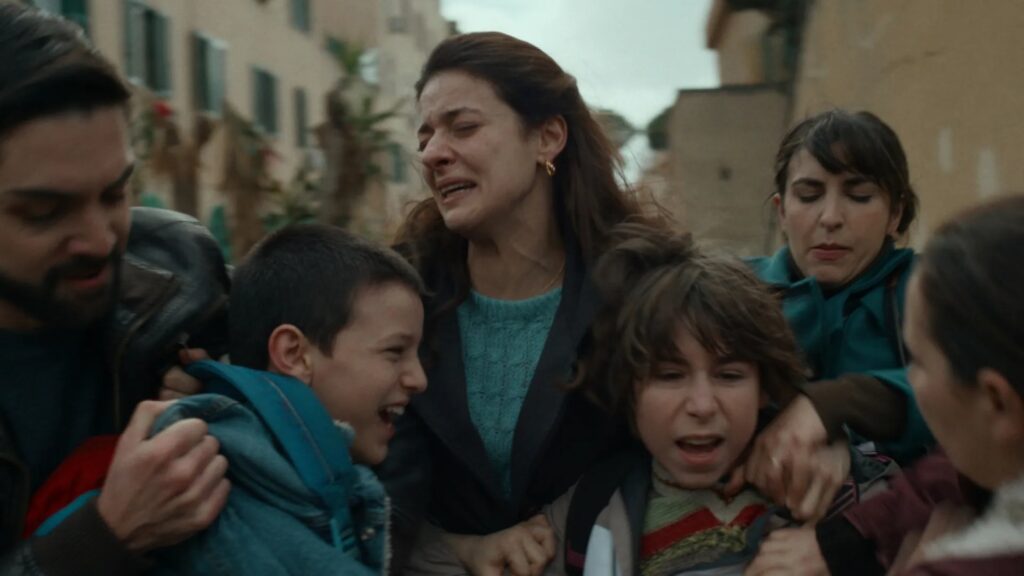Director Francesco Costabile brings a genre feel to his family melodrama Familia, Italy’s submission for the 2026 best international feature Oscar.
The film is based on Luigi Celeste’s memoir about his youth as a far-right militant and the legacy of his toxic, violent upbringing at the hands of his criminal father. The film premiered in the Horizons sidebar of the Venice Film Festival last year, winning the best actor prize for star Francesco Gheghi, who plays Luigi, at the fest.
Francesco Di Leva, who was honored with the David di Donatello award for best supporting actor, and Barbara Ronchi co-star in the movie as the parents.
Attilio de Razza and Nicola Picone produced the film for Rome-based Tramp Limited, in association with Nicola Giuliano at Indigo Film, Pierpaolo Verga at O’Groove, and Medusa Film, which is the Italian distributor of the film. True Colours is handling international sales.
Costabile talked to THR, supported by a translator, about Familia, the social and psychological issues it explores, his use of horror aesthetics, and what’s next for him.
Do you see Familia as a continuation of your exploration of certain big and difficult themes? I never saw your previous film, but I read it was about a young rebellious girl who lives with her grandmother and her uncle in a remote part of Southern Italy…
The first movie I made was called Una Femmina: The Code of Silence, and it was also based on a true story. It was pretty much about the same themes, mainly domestic violence, even though it was in the context of a criminal organization.
Violence against women is a phenomenon that is much bigger and goes across all cultural and social classes. Many films just give us a very limited perception of it.
The new movie, Familia, increases the discussion about this topic because it is about a family in which everyone can actually recognize themselves. The social context is more universal, not limited to a very particular group. And we wanted to also explore how this affects the male universe and masculine culture in a toxic way.
Some of your visuals, especially when it comes to = domestic violence, look and feel like horror films or thrillers. Do you have an interest in genre cinema, and why do you like to tap into these aesthetics?
Yeah, I love horror films and also American independent cinema. I like to mix languages in cinema to increase the emotional reaction of the audience. And I also think that reality now is more horrific than fiction. In this social context, the real horror is in reality. So, it is better to clarify that. I try to include horror elements to show that the horror is in reality itself.
Were there any specific cinematic inspirations for Familia?
I studied Scorsese movies, especially the early Scorsese movies, for example, Mean Streets, Raging Bull,
Cape Fear.I love this cinema that tells stories with big suspense. And I love to mix genres.

‘Familia’
How did you work with your lead, Francesco, to get this powerful performance?
I had a very long casting process. I was very focused on finding the right faces, because the faces are the instrument to reflect emotions and make the audience feel these emotions. Francesco Gheghi is an extraordinary actor. He is very young, only 22 years old. He reminds me of a young Marcello Mastroianni in terms of how he moves, speaks, acts, and his eyes.
Francesco combines the rage of a troubled adolescence with the fragility of that age, for example, in his contact with the Neo-fascist movement. He is also able to show the fragility of someone who is still a kid and not an adult yet. So this combination of sweetness and rage was something that I wanted to show to the audience, and Francesco was the perfect actor for that.
I also combine professional actors with non-professional actors. In particular, all the guys from the fascist group are from street castings, especially from boxing gyms.
Without spoiling things for people who have not seen Familia yet, there is a showdown scene between father and son that felt like it had so many layers and gave me very conflicting emotions. Can you share anything about shooting that scene?
It was very complex because the two characters see themselves in each other, like in a mirror, and it was a dramatic and tragic moment, and emotionally overwhelming. Because I know the real Luigi Celeste and the family, I felt the responsibility to reflect those complex feelings.
The same was true for a scene in which the kids are taken away from their mother. I like to make cinema that makes the audience emotionally uncomfortable. Cinema is beautiful and wonderful. However, the cinema that shapes your conscience and your emotions is the kind of cinema that I want to make, especially when it’s also social, political cinema.
How did it feel to be submitted for the international Oscar?
I was completely speechless. I didn’t believe it was real. When I got the phone call from the people from the Commission, I believed it was a joke. But it’s a dream.
And going to the United States, which they say is where dreams come true, I want to see the impact that the film has on the audience in today’s America. I want to see how the audience reacts to the themes and topics that are tackled in the film.
Do you know what you will do as your next project?
There is a new project, which combines a bit the themes of my first two films and can be considered the closure of a sort of trilogy on violence. But I cannot say much more yet.

